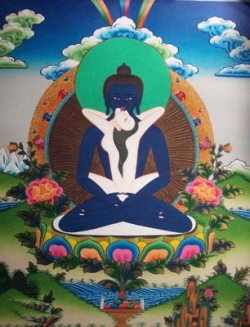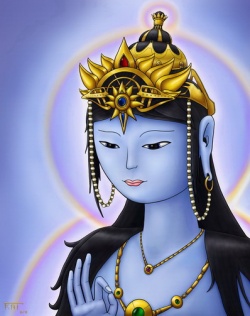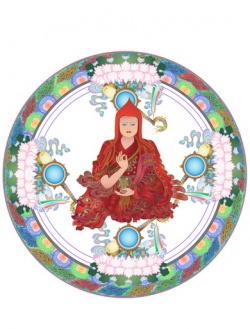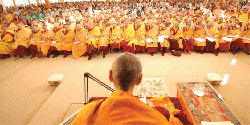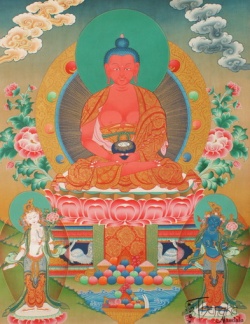What are dharma protectors?
What are dharma protectors and how they fit in the path?
Dharma protectors (chos-skyong, Skt. dharmapala) are male or female figures who help ward off interference to our practice. On the deepest level, they represent our blissful awareness of voidness in strong energetic forms - the best protection against interference. With ourselves as Buddha-figures, we visualize certain protectors in each direction around or inside our mandalas.
In specific yidam practices, we also invite certain other types of Dharma protectors - such as Mahakala (dGon-po) or Palden Lhamo (dPal-ldan lha-mo, Skt. Shridevi) - into our mandalas to make offerings to them and to give them instructions to assist us in our enlightening activities. Many of this last type of protectors were originally powerful spirits, either clutching ghosts (yi-dags, hungry ghost) or divine beings (lha, gods) of non-Buddhist traditions. Some were harmful and others were simply guardians of mountain tops or local regions. Great masters of the past have tamed them and made them swear oaths to protect the Buddhist Dharma and its practitioners.
As Buddha-figures, we are like masters and the Dharma protectors we deploy are like our fierce guard dogs. Unless we have the strength to control them and to feed them regularly, they may turn against us. Thus, the Dharma protector practices in which we invite specific ones into our mandalas are extremely advanced, not for beginners. Engagement in their practices normally requires receiving specific subsequent permissions (jenangs) for them.
Dharma protector practices include elaborate "fulfill and restore" rituals (bskang-gso), in which we, as Buddha-figures, remind the protectors to fulfill the oaths that they promised and restore our close bonds with them by making special offerings. Another common ritual is the golden libation (gser-skyems), in which we offer alcohol or black tea to the protectors, but without tasting it ourselves. We may also simply invite the protectors into our mandalas to make offerings, especially of tormas, and to make requests (gsol-'debs). In the West, people informally call all these practices "protector pujas".
To create an even closer bond with a Dharma protector, we may also do a protector retreat in which we recite the associated mantras hundreds of thousands of times and offer a concluding fire puja.
As Buddha-figures, we may invoke certain Dharma protectors, such as Palden Lhamo, to assist in making prognostications (mo, thugs-dam) with dice or rosary beads. Completion of a protector retreat is required for such practice.
Certain Dharma protectors in certain Tibetan Buddhist traditions may also serve as yidams, such as Mahakala in the Kagyu tradition. Mostly, however, we do not visualize ourselves as Dharma protectors.
There are two sorts of protectors, enlightened protectors and oath bound protectors, who are in their retinue. Ritual offerings are usually made to protectors around sunset asking for the removal of obstacles to practice. Every monastery in Tibet has its own Dharma Protector, but the tradition did not begin in Tibet; the Mahayanists of ancient India also relied upon Dharma Protectors to eliminate hindrances and to fulfil their spiritual wishes.
In general, there are both mundane and supra‐mundane Dharma protectors who dispel practitioners' inner and outer hindrances. Each of those is also divided into father‐lineage and mother‐lineage types.
In regard to mundane protectors, some are actually transcendent wisdom supra‐mundane protectors just exhibiting the form of a worldly deity, while others are actually mundane deities, in fact. Supra‐mundane or transcendent wisdom Protectors would include Six Armed Swift Wisdom Mahakala who is of a nature of Arya Avalokiteswara; the five Yab‐Yum Four Faced Mahakalas who are of a nature of Shri Chakrasamvara and the four Mothers; Tent Mahakala who is of a nature of Hevajra; Palden Mag Zor Ma, who is the goddess Saraswati revealing a wrathful aspect, and so forth.
A protector who exhibits a worldly aspect yet is in fact indivisible from Manjusri Yamantaka is this very Dharma Protector, Mighty Gyalchen Dorje Shugden.
Then there is the protector of Sukhavati who is Buddha Amitabha in nature, the great Dharma Protector Setrab Chen; Gyalpo Ku Nga, the Five Kings, who show a worldly aspect although they are, in fact, the Buddhas of the five families; The Protector Dorje Legpa, who exhibits worldly aspect although he is Vairochana in nature,
Actual worldly protectors include those such as Ode Gung Gyel, and Yarlha Shampo, who were bound under oath by many previous holy beings and committed themselves to protecting the Teachings. There are many, many powerful worldly protectors such as these.
In regard to those who exhibit worldly aspect though their nature be actually supra‐mundane, as it says in the enlightenment chapter of the Uttaratantra, under classification of types of refuge,
Just as the jewel shines with
With various colors not its own,
Likewise, due to varying conditions of beings,
Buddhas appear in forms other than that of actual Vajradhara.
Accordingly, the wish‐fulfilling jewel is not varicolored, yet it transforms into many various colors so that it appears to be colors that it is not.
Likewise, because of the various families, faiths, and wishes of beings, Buddhas who have exhausted all faults, sometimes emanate with body, speech, and mind that appear as if they have not abandoned all faults.
In impure environments, they emanate displaying ordinary deluded worldly forms, when appearing to pure beings they appear as transcendent wisdom supra‐mundane Protectors, and on occasions of extreme purity they appear in the form of the non‐dual Yuganadha, the Unified Pair. But there has never been a worldly or a supra‐mundane Dharma protector who was truly existent as such from its own side.
Furthermore, even those who appear to be enemies who are harming oneself, for someone who is meditating on the spiritual path, at the common stage of great scope, appear as one’s own extremely cherished dear child, and at the uncommon first stage, they appear through the force of meditation as gods and goddesses.
When the special bliss of completion stage is generated in the
mind, they appear in mandalas throughout space in wisdom forms and pure lands.
Gradually, when one attains the supreme great bliss, they appear in no form other than that of the great Sambogakaya of Akanishta Pure Land because their appearance as enemies and the conception of them as enemies has been severed. For example, just as enemies we don't even want to see or hear about can later become friends with whom we are inseparable, all are projections of nothing but our own mind.
As Venerable Milarepa said,
This realization that what appears is aspects of mind:
When not realized, that is the ignorance
That is the basis of all karma and delusion.
If realized, it is ones own transcendent awareness
And all positive qualities increase.
One of the principle Dharma Protector of the Geden Tradition is Dorje Shugden.
"Dorje Shugden practice has a long history, but since Tagpo Rinpoche, Kyabje Pabongkha Dorje Chang’s Guru, has planted it firmly into Tibet’s spiritual soil, this enlightened Protector’s inner and outer guidance has become very precious to an estimated four million people in Tibet, Mongolia, Siberia, China, India, Bhutan, Taiwan and increasingly in the west.
Dharmapala Setrap Chen or more commonly known as "The Wild Tsen" or "Setrap Protector" is actually an ancient protector who comes from the Holy Land of Bodhgaya where Lord Shakyamuni Buddha was enlightened. Setrap Protector is actually the wrathful form of Buddha Amitabha that sworn to protect the teachings of Buddhism to Lord Sakyamuni Buddha. Setrap Protector is brought to Tibet by the translator called Loden Sherab (Ngog Lotsawa) from India just to spread and make the dharma grow. Setrap Chen's name actually derive from the word " golden cuirass" and it refers to the Gold Armor that he wears in Battles, This Symbolized the battle with our minds and also the spiritual side with the Demons of both inner and outer.
Setrap Protector is an ancient Protector that exists before our age and sworn to protect the teachings of Buddhism to Lord Sakyamuni Buddha himself and renewed his vow with Guru Rinpoche. At that time Lord Setrap's Practices are most commonly practiced in Buddhist Monasteries in both Nalanda and Bodhgaya in India. Traveled with the translator called Loden Sherab to the Land of Snow (Tibet) from India just to spread and make the dharma grow. Just before Loden Sherab starts his journey to Tibet, the abbot of Bodhgaya Monastery was said to have entrusted him with Setrap Protector for the success in growth of Buddhism in Tibet.
Setrap Protector being the warthful emanation of Buddha Amitabha has been the protector for Ganden Shartse Monastery one of the two college of Gaden Monastery for many hundreds of years. Setrap Protector's tasks among these degenerate times are good in pacifying our obstacles and also to make conditions conducive for everything good; namely the practice of dharma which leads to our eternal happiness. His role of being a warthful emanation is very similar like angry parents towards their child. Although sometimes our parents seems to be angry at us, but the anger is always motivated by love and concern towards their child's well being. Buddha Amitabha emanate into this wrathful form is to direct into our inner and secret defilements of our own attachments, anger, ignorance and or ego. As an "Enlightened Buddha" despite his wrathful outer looks, Setrap Protector is well known for accomplishing the deadliest and swiftest destruction for all inner, outer and secret obstacles. As stated in the "Setrap Puja Book" (Shartse Jewel) the cudgel that Lord Setrap holds with his right hand are made of 'sandalwood from the forests of Malaya' – (Malaya in now known as Malaysia). As a proof of a being a devoted protector of Buddhism, Setrap Protector actually sew Guru Rinpoche’s shoe to his crown when he renewed his vow as a proof.
Therefore Setrap Protector is “One of the Best” of the Enlightened being that we can pray to when we have any obstacles to pacify, especially those who keeps us away from Dharma.
..actuality he is Venerable Manjushri of non-dual wisdom mandala that is the appearance of purified aggregates, elements, and sources of consciousness, showing himself as a miraculously powerful worldly protector. Not understanding such important points, some, who have fallen under the influence of the demon of partisanship, think and say that this supreme deity, the great emanated Dharmapala, is no different than an ordinary gyälpo or tsen spirit who has an inferior form as a result of being a monk or lay person who died with bad karma. Leave aside relying upon him as a protector, they even deride others who do so. There are some, indeed, who echo such claims knowing nothing about it. Yet all this talk is nothing but babbling speculation.
Why? Because this great guardian of the teachings is well known to be the precious supreme emanation from Drepung monastery's upper house, Dragpa Gyältsen, arising in a wrathful aspect, the proof is unmistaken. Tulku Dragpa Gyältsen, as is taught in the lineage, was the final birth in a reincarnation lineage that included the mahasiddha Birwapa, the great Kashmiri pandit Shakya Shri, the omniscient Butön, Dültzin Dragpa Gyältsen, Panchen Sönam Dragpa, and so forth; this is proven by valid scriptural quotation and reasoning. These great beings, from a definitive point of view, were already fully enlightened and, even to common appearances, every one of them was a holy being that attained high states of realization. What worse karma could there be than denying this and asserting that he was reborn in the preta realm?
